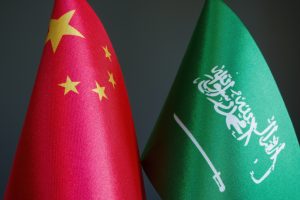On May 21 and 22, the finance minister of Saudi Arabia and his Chinese counterpart concluded their talks with an emphasis on bolstering partnerships in fields including artificial intelligence, renewable energy, and smart cities. That follows up on the establishment of a “comprehensive strategic partnership” by Crown Prince Mohammed bin Salman and China’s Xi Jinping in December 2023.
Prior to that, in March 2023, China played a very significant mediating role in the Saudi-Iranian rapprochement. Saudi Arabia was invited to the informal BRICS grouping, which consists of China, Brazil, Russia, India, and South Africa in August 2023. China’s Belt and Road Initiative (BRI), which is aligned with the Saudis’ Vision 2030, has made considerable investments and will benefit Riyadh’s push to diversify the Saudi economy away from its reliance on oil.
These opportunities have offered Saudi Arabia a great deal of room for growth and modernization. In the background, the Kingdom is trying to strike a balance between short-term economic benefits from China and its long-standing strategic alliance with the United States, which is essential for the security and stability of the region.
China’s growing footprint in the Gulf region is a reflection of its strategic goals, which include securing energy supplies, gaining clout, and forging closer political and economic relations with the nations that make up the Gulf Cooperation Council. China is among the biggest buyers of oil from the Gulf states, especially from Iran, Saudi Arabia, and the United Arab Emirates.
China’s BRI, which involves significant investments in ports, infrastructure, and logistics intended to enhance connectivity and improve trade routes, relies heavily on the Gulf. All the GCC members have signed cooperation documents relating to the BRI. Iran has too, in a rare point of convergence between Tehran and its Gulf rivals.
China may be able to facilitate the formation of a more multipolar global order, one of its stated goals, through its strategic ties and investments with countries like Saudi Arabia. China’s affiliation with the Gulf signals a move away from U.S. hegemony and toward more diverse global power centers.
Amid this evolving relationship, the United States maintains a long-standing strategic partnership with Saudi Arabia, featuring military bases and extensive cooperation on security and intelligence matters. The Saudi-U.S. alliance is deeply rooted in history and marked by substantial economic and military cooperation.
Saudi Arabia’s economy is still strongly tied to the United States’ since its oil sales are conducted in U.S. dollars and its currency is fixed to the greenback. Its economy is mostly dependent on this revenue. As a result, the Saudi economy is directly impacted by the strength of the U.S. dollar and the state of the world oil market.
Saudi Arabia is viewed by Washington as a crucial ally in preserving Middle East stability, particularly in light of Iran’s bid for regional influence and the war on terror. Saudi Arabia has also historically enjoyed security guarantees from the United States, especially against Iran and other regional adversaries. China has not yet shown either the capability or the willingness to take over from the U.S. in this capacity, especially given Beijing’s close ties to Iran.
China traditionally follows a non-interference policy in the Middle East and lacks the extensive military infrastructure that the U.S. has in the region. China’s military engagement in the Persian Gulf is currently limited to anti-piracy operations and some arms sales, far from the comprehensive security umbrella provided by the United States.
Saudi Arabia’s involvement with China can be seen as short-term, primarily driven by the pursuit of immediate economic gains and energy collaboration. This encompasses trade pacts, investment arrangements, and infrastructure ventures aligned with China’s BRI. While these ventures present prospects for diversification and economic expansion in Saudi Arabia, they might not possess the enduring depth found in Riyadh’s relationship with the United States. China’s stance of non-interference in the internal affairs of other countries, while appealing to many nations for the emphasis on respecting sovereignty, does not address Saudi Arabia’s critical security concerns. Riyadh views Iran as a significant regional adversary, posing threats through its nuclear ambitions and support for proxy groups in countries like Yemen, Lebanon, and Syria.
The United States is on the verge of signing a crucial bilateral defense pact with Saudi Arabia, which will significantly bolster its security commitment to the kingdom. It is expected to include formal U.S. assurances to defend the kingdom and grant Saudi Arabia access to advanced U.S. weapons. In exchange, Saudi Arabia would halt its arms purchases from China and limit Beijing’s investments in the country.
Given the increasingly apparent China-U.S. rivalry, it would be critical to consider Saudi Arabia’s geopolitical orientation. The shifting dynamics and historical context are just two of the factors that will impact Saudi Arabia’s stance. Chinese diplomacy has the potential to alter the situation by providing economic incentives that would help Saudi Arabia to achieve its short-term objectives.
That said, China may not be able to match Saudi Arabia’s deep-rooted security alliance and collaborations with Washington. As a result, Riyadh’s long-standing and extensive connection with the United States is unlikely to be replaced, even though economic cooperation with China is expected to continue and even grow. Saudi Arabia’s future strategic posture may entail maintaining a very careful balance between these two powers, allowing it to take advantage of economic possibilities while preserving crucial security partnerships.

































